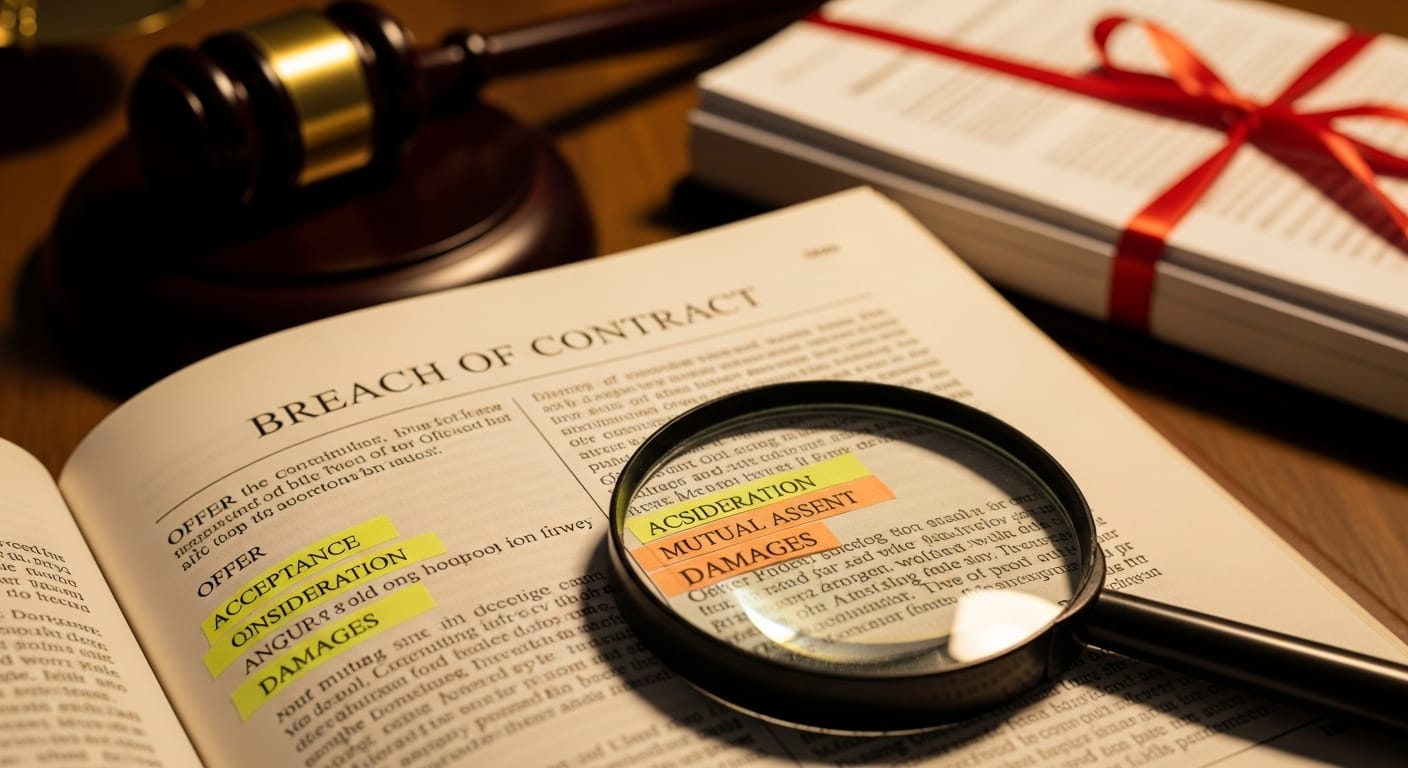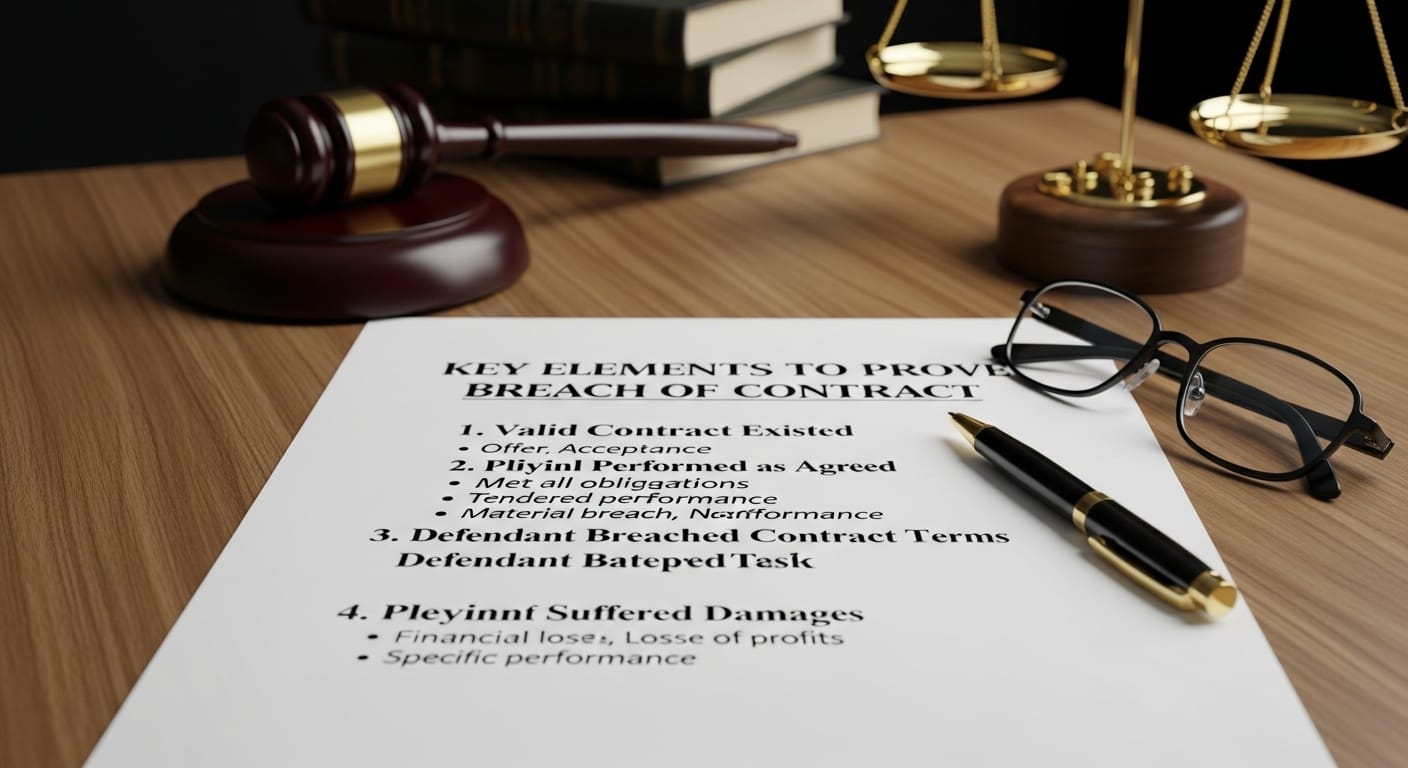Let’s be honest: proving a breach of contract can feel like trying to assemble IKEA furniture without the instructions. You know it’s supposed to make sense, but the pieces don’t always seem to fit together.
Whether it’s an undelivered service, a missed payment, or that time your friend promised to split the bill but conveniently “forgot” their wallet (again), understanding what you need to prove is the first step in turning chaos into compensation.
Contracts are the backbone of business, friendships (don’t lend anything without one), and just about every adult interaction outside of pizza night.
So, if someone doesn’t hold up their end of the bargain, you’ve got to be ready to prove it. Let’s break it down into manageable pieces and figure out what’s essential to show a breach of contract—and maybe how to avoid a courtroom meltdown.
Please Note: This post may contain affiliate links. If you click one of them, we may receive a commission at no extra cost to you. As an Amazon Associate, I earn from qualifying purchases.

Top Takeaways and Key Concepts
Prove a Valid Contract Exists: Ensure the agreement includes offer, acceptance, consideration, and mutual intent.
Document Performance and Non-Performance: Keep receipts, emails, photos, and other evidence showing both parties’ actions.
Identify the Breach Type: Determine whether the breach is material or minor to support your claim effectively.
Demonstrate Damages: Quantify financial or other losses directly caused by the breach using clear evidence.
Prepare for Defenses and Hire Legal Help: Anticipate common defenses and consult a lawyer for strategic guidance.
Summary of This Article
The article explains how to prove a breach of contract by first establishing a valid agreement with clear terms. It emphasizes documenting both performance and non-performance to show who failed to uphold their obligations. Identifying whether the breach is material or minor helps clarify the impact on the contract. Demonstrating damages requires quantifying losses directly caused by the breach, supported with evidence such as invoices and emails. Finally, anticipating common defenses and hiring a skilled lawyer increases the likelihood of successfully obtaining compensation.
Existence of a Valid Contract

Before you can accuse someone of breaching a contract, you first have to prove that the contract exists. This might seem like a no-brainer, but in the legal world, it’s not as simple as saying, “We had a deal!” The court doesn’t care about your handshake agreement unless there’s some solid evidence backing it up.
A valid contract requires four elements: an offer, acceptance, consideration (legal term for “something of value”), and mutual intent to be bound. For example, if you promised to pay your neighbor $100 to mow your lawn, that’s a contract—assuming they agreed to the terms and didn’t just laugh and walk away.
By the way, written contracts are the gold standard here. If you’re relying on a verbal agreement, you’d better have proof, like emails, texts, or witnesses who heard both parties agree. And don’t even try the “I swear we talked about it over drinks” defense. Courts aren’t big fans of that one.
Proof of Performance (or Non-Performance)
Next up, you’ll need to show that you upheld your end of the bargain—or at least that you were ready and willing to. This is where documentation becomes your best friend. Did you make the payment? Show the receipt. Did you deliver the goods? Break out the delivery confirmation.
On the other hand, if you’re arguing that the other party didn’t perform, you’ll need evidence of their failure. Let’s say you hired a contractor to build a deck, and instead, they built what looks like a wobbly treehouse for squirrels. Take pictures, keep emails, and save any frustrated texts you sent saying, “Uh, this isn’t what I paid for.”
Proving performance (or lack thereof) shows the court who dropped the ball—and let’s be real, nobody wants to be the guy caught holding the dropped ball.
Breach of the Contract
Here’s the heart of the matter: you have to show that the other party failed to do what they agreed to in the contract. There are a few different types of breaches, and understanding which one applies to your case can make or break it.
Material Breach
A material breach is a big deal. It’s when the failure is so significant that it defeats the whole purpose of the contract. For instance, if you hired someone to cater a wedding, and they brought cold fast food instead of the lobster feast promised, that’s a material breach.
Minor Breach
Not all breaches are catastrophic. A minor breach might involve small deviations from the agreement. Sure, it’s annoying, but it doesn’t necessarily void the entire contract. For example, if your caterer brought lobster but forgot the dessert, that’s probably minor. (Unless dessert was the *only* reason you agreed to the contract.)
To prove a breach, gather evidence that shows what was agreed upon versus what actually happened. Contracts, receipts, emails, and even photos can all help paint the picture.
Demonstrating Damages
The whole point of proving a breach is to get compensated for your losses, but courts don’t just hand out money for hurt feelings. You need to prove actual damages—whether financial, emotional (in rare cases), or otherwise.
Let’s say you hired a photographer for an event, and they never showed up. What did that cost you? Did you have to hire a last-minute replacement? Did you lose business because you couldn’t advertise the event afterward? Quantify those losses. Judges love numbers—they’re like catnip for courts.
Proving damages can involve everything from invoices to expert testimony. The goal is to show exactly how the breach impacted you and why you deserve compensation.
Causation: Linking the Breach to the Damages
Here’s a fun one: you have to connect the dots between the breach and the damages. Just because you’re upset doesn’t mean you can blame the other party for everything that went wrong.
For example, if your contractor didn’t finish building your deck and you slipped on a wet floor in your kitchen, you can’t claim the contractor caused your injury. The damages you claim must be directly related to the breach—no matter how tempting it is to throw everything into the complaint.
Think of causation like solving a mystery. You need a clear path from “They didn’t do X” to “I suffered Y.” The court won’t accept vague connections, so make your argument as straightforward as possible.
Common Defenses to Watch Out For
Even if you’ve got all your ducks in a row, the other party isn’t going to roll over and admit fault without a fight. They might argue that the contract wasn’t valid, that they performed as required, or that you waived your rights by not objecting earlier.
One common defense is claiming impossibility. If fulfilling the contract was genuinely impossible—think natural disasters or other unforeseeable events—they might be off the hook. Another is arguing you didn’t mitigate your damages, meaning you didn’t take reasonable steps to minimize your losses.
Prepare for these defenses ahead of time so you’re not blindsided in court.
The Importance of a Strong Legal Team
Finally, if you’re serious about proving a breach of contract, don’t go it alone. A good lawyer can help you organize your evidence, craft a compelling argument, and navigate the complex legal system.
On the other hand, trying to handle a breach case solo is like trying to change a tire with a spoon. Sure, it’s possible, but it’s probably not going to end well. Invest in professional help—it’ll save you time, stress, and maybe even money in the long run.
Conclusion: Proving a Breach Is About Preparation
At its core, proving a breach of contract comes down to showing a valid agreement, evidence of non-performance, and clear damages. With the right preparation, you can make your case convincingly and get the compensation you deserve—or at least a solid shot at it. Just remember: documentation is your best friend, and a good lawyer is your ace in the hole.
Suggested Resources:
– How to Prove a Breach of Contract
https://www.nolo.com/prove-contract-breach
– Understanding Breach of Contract Damages
https://www.lawdepot.com/breach-of-contract-damages
– Common Defenses Against Breach of Contract Claims
https://www.legalresources.com/contract-defense
Frequently Asked Questions
What are the key elements required to prove a breach of contract?
You must prove a valid contract existed, that one party failed to perform their obligations, and that the breach caused measurable damages supported by evidence.
How can I prove that a valid contract existed?
Show evidence of an offer, acceptance, consideration, and mutual intent to be bound, ideally through written documents, emails, or witness statements.
What types of evidence help prove performance or non-performance?
Receipts, delivery confirmations, emails, photos, and written correspondence can show whether you fulfilled your duties or the other party failed to do so.
What is the difference between a material and a minor breach?
A material breach significantly impacts the contract’s purpose, while a minor breach involves smaller issues that don’t completely invalidate the agreement.
How do I demonstrate damages caused by the breach?
Provide documentation of financial losses, replacement costs, or other harm directly resulting from the breach, such as invoices or expert testimony.
What defenses might the other party use against a breach claim?
Common defenses include claiming the contract was invalid, the breach was impossible to avoid, or that you failed to minimize your losses after the breach.
Should I hire a lawyer for a breach of contract case?
Yes, an experienced lawyer can help gather evidence, anticipate defenses, and present a strong case to maximize your chances of winning compensation.

Kevin Collier is a legal expert passionate about simplifying complex legal concepts for everyday individuals. With a focus on providing clear, practical information, he covers a wide range of topics, including rights, responsibilities, and legal procedures. Kevin aims to empower readers with the knowledge they need to navigate the legal landscape confidently, ensuring they can make informed decisions regarding their legal matters. Through insightful articles and easy-to-understand resources, he helps demystify the law, making it accessible to all.










